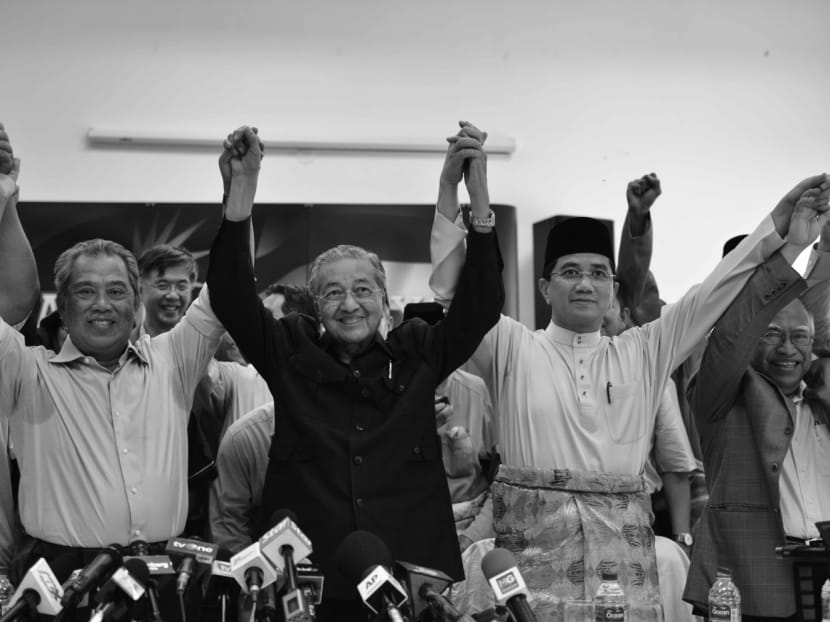New chapter opens in Malaysian politics, with more battles to come
In the past month, Malaysian Prime Minister Najib Razak has struck back at two of his key nemeses by first removing Mr Mukhriz Mahathir from the post of Kedah Chief Minister, before suspending former Deputy Prime Minister Muhyiddin Yassin from the ruling United Malays National Organisation (UMNO).

Last week’s Citizens’ Declaration press conference of opposition leaders and Dr Mahathir (centre) will fracture the Malay support UMNO is heavily reliant on for political legitimacy. Photo: AP
In the past month, Malaysian Prime Minister Najib Razak has struck back at two of his key nemeses by first removing Mr Mukhriz Mahathir from the post of Kedah Chief Minister, before suspending former Deputy Prime Minister Muhyiddin Yassin from the ruling United Malays National Organisation (UMNO).
Both Mr Muhyiddin and Mr Mukhriz are seen to be aligned with former Prime Minister Dr Mahathir Mohamad, who is openly calling for Mr Najib’s resignation, ostensibly over alleged corruption and wrongdoing related to troubled state investment firm 1Malaysia Development Berhad (1MDB).
The suspension of Mr Muhyiddin and the sacking of Mr Mukhriz do not signify an end of the Mahathir era, as some have argued.
Instead, these events have opened a new chapter in Malaysian politics that could pose a serious threat to Mr Najib.
Mr Muhyiddin still holds sway over a reasonable portion of UMNO, particularly in his home state of Johor. Similarly, Mr Mukhriz is free of scandal and has popular appeal beyond his home state of Kedah.
It is highly unlikely that he will go away quietly and be bullied by the political manoeuvres of the powers-that-be.
With his sacking as Chief Minister, Mr Mukhriz can now move to the national stage and lead the charge against Mr Najib with the explicit support of his father, Dr Mahathir.
At 51, Mr Mukhriz is relatively young and has time on his side. Before his sacking, he was seen in some quarters as a potential future Prime Minister, given the dearth of young leaders in UMNO. Now that he is not restrained by officialdom, he can potentially emerge stronger as a political voice by capitalising on public angst against recent government scandals and his own ouster.
Another scenario that could emerge is Mr Mukhriz and Dr Mahathir working more closely with the Opposition in a joint bid to oust Mr Najib. This could be potentially damaging for Mr Najib and UMNO, with opposition leaders Azmin Ali and Rafizi Ramli expressing openness to such a permutation. Jailed opposition leader Anwar Ibrahim himself has also declared his support for Dr Mahathir, formerly his fiercest political opponent.
Just last week, Dr Mahathir, Mr Muhyiddin and Mr Mukhriz along with various opposition leaders and others numbering a total of 58 people, held a press conference as “concerned citizens” to sign a declaration calling for the removal of Mr Najib as Prime Minister, the repeal of recent undemocratic legislation and the restoration of autonomous institutions.
The move will further fracture Malay support that UMNO is heavily reliant on for political legitimacy, and could have damaging repercussions for the party’s chances in the next General Election, due by 2018.
Given the stakes involved for the political players involved, we can expect them to dig in their heels and up the ante in the coming months.
ALL EYES ON SARAWAK STATE ELECTIONS
For now, Mr Najib’s moves to eliminate every single opposition to his leadership in UMNO appears to have helped him to secure his political position within the ruling part. However, elections are won by winning the support of the Malaysian electorate, not UMNO leaders or members.
The premier remains highly unpopular among the Malaysian public. The recent investigations by a number of countries over the 1MDB issue and the assertion by the Saudi Foreign Minister contradicting Malaysian authorities’ claims that the RM2.6 billion (S$868 million) that was deposited into Mr Najib’s personal accounts was a political donation from the Saudi government have further tarnished his reputation.
These developments took place after a poll by the Merdeka Center late last year found that Mr Najib’s approval rating was only 23 per cent.
Support from the Malay vote bank for Putrajaya stood at only 31 per cent, a massive drop from the 52 per cent at the beginning of last year.
The urbane, blue-blooded Mr Najib has surprised some observers with his fierce fightback against his opponents. But this has left himself exposed to further attacks. The recent Citizens’ Declaration press conference of Dr Mahathir and opposition leaders is a good example of this.
Mr Najib has also sought to exercise greater executive power in the form of a National Security Council Bill and other legislation.
But the move will not be well received by most Malaysians, who perceive it as a sign of increasing authoritarian tendencies on the part of the Prime Minister.
It may be too early to call time on Mr Najib’s tenure yet, but an UMNO with Mr Najib as president could struggle for legitimacy in the eyes of an increasingly disillusioned public, especially when facing the 14th General Election.
With the removal of Mr Mukhriz and Mr Muhyiddin, it is likely that UMNO and the ruling Barisan Nasional coalition will lose Kedah to the Opposition in the next election, given that the state was won back by a slim margin in the 2013 General Election.
This, coupled with a loss of support in Johor and Sabah following the suspension of Mr Muhyiddin and Mr Shafie Apdal — a key Sabah UMNO leader who lost his Cabinet post last year — might be enough to tip the balance in favour of the Opposition in the next election.
The upcoming Sarawak state elections may serve as an interesting barometer in measuring support for the government.
ABOUT THE AUTHORS:
Mohamed Nawab Mohamed Osman is Coordinator of the Malaysia Program at the S Rajaratnam School of International Studies (RSIS) and Rashaad Ali is a Research Analyst at RSIS.









